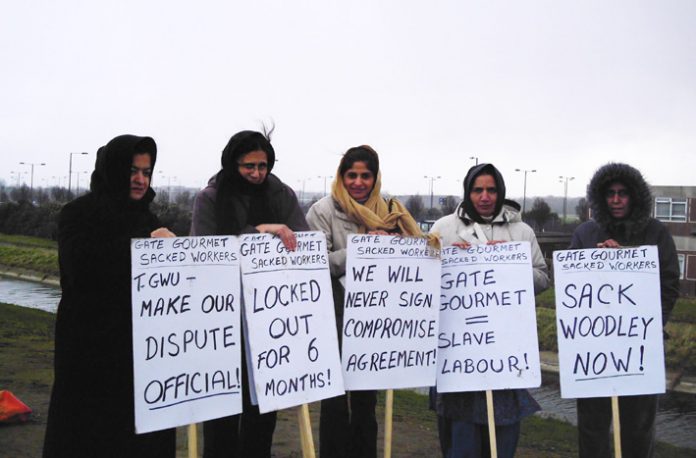Amid mounting Israeli restrictions on Palestinian freedom of movement, President Mahmud Abbas on Saturday sponsored the swearing in of the new Hamas-dominated Palestinian Legislative Council (PLC).
Abbas, the Fatah party president of the Palestinian National Authority (PNA), told the new PLC on Saturday that ‘after consultations’ Hamas will be asked to form the new Palestinian government, but reiterated Palestinian commitment to peace and negotiations.
Abbas confirmed that ‘the Palestinian peace offensive’, supported the national ‘armed struggle’ and had enabled the Palestine Liberation Organisation (PLO) to survive, especially after the ‘collapse of the Soviet Union’ and the Gulf War in 1990-91.
He reminded his audience of the importance of the PLO National Council meeting in Algiers in 1988, which adopted the Palestinian ‘Declaration of Independence’, accepted the UN Security Council resolutions 242 and 338, and which led to the US-Palestinian dialogue, the Madrid peace conference, then the Oslo agreement with Israel and the mutual PLO-Israeli recognition.
‘Since Oslo was signed, Oslo has become a political reality and we will continue this accord,’ Abbas insisted.
He defended conducting ‘secret negotiations’, but confirmed that, as with Oslo, the ‘outcome of negotiations’ will be presented to ‘representative institutions’ for approval.
Abbas in his speech to the new PLC also confirmed: ‘We will abide, presidency and government, by our commitment to the negotiating path as a political option.’
He said that the PNA should develop forms of ‘popular and peaceful resistance’ to the 39-year old Israeli occupation.
He called for the reactivation of the PLO as the leadership responsible for negotiations.
Refusing Israeli ‘unilateralism’, Abbas called on the ‘civilised world’, the Quartet of the US, the UN, the EU and Russia, and in particular the US Administration, to seriously and instantly begin revival of the negotiating track on the basis of UN legitimacy, Arab peace initiative, the ‘roadmap’, and US President George W Bush’s vision of a two-state solution of the Palestinian-Israeli conflict.
Confirming that ‘there is a Palestinian partner’ for peace negotiations with Israel, Abbas refused a Palestinian state with provisional borders.
The PNA president also warned Israel against using the Hamas electoral victory as ‘a blackmailing tool’ to ‘punish our people’, saying: ‘I refuse this blackmail.’
He also pledged to carry on with reforming the PNA, a process ‘that should not stop’, he said, because ‘I am determined to implement the platform on the basis of which the people elected me.’
Abbas said that ‘security’ will determine ‘the future of our experiment’, and this means ‘the implementation of our commitments’.
Referring to the ongoing security chaos in the occupied Palestinian territories, he said: ‘The (new Hamas-led) government should not allow this shameful phenomenon to continue.’ Encroachment on private property, killings and kidnapping, especially of foreigners, should stop, he said.
Diplomats, outgoing Palestinian Prime Minister Ahmad Qurei, outgoing lawmakers and the Speaker of the National Council of the PLO, Salim al-Za’noun, members of the Executive Committee of the PLO, leaders of anti-occupation factions and Palestinian religious leaders attended the inauguration of the PLC, the second since 1996.
After reading verses of the Koran and to the tunes of the Palestinian national anthem, the historic session of the PLC was opened.
Technical problems in the video conference system briefly prevented contact with the Gaza chamber of the PLC.
Because of Israeli-imposed travel bans, Saturday’s PLC session was held simultaneously in Gaza City and the West Bank city of Ramallah, with legislators in the two places hooked up by video conference. Many of the 132 legislators could not attend: 13 are in Israeli prisons, and one in a PNA jail in Jericho.
Israeli Occupation Forces (IOF) early Saturday cordoned Ramallah with military roadblocks and almost completely closed off the northern West Bank.
Meanwhile, Speaker of PLO National Council Al-Za’noun confirmed that the PLC members are also members of the PLO National Council (parliament-in-exile).
Declaring that he will resign his post within four months and will attend the next Fatah general conference, Al-Za’noun stressed the national unity between the Palestinians inside and outside the homeland and suggested creating a ‘permanent office’, including the PLO National Council and the PLC speakers to unite the Palestinian representatives in one legislative entity.
He criticised the Arab league parliament for extending two invitations of membership, one for the PLO and another for the PLC.
Al-Za’noun indicated that the PLC constitutes one fifth of the PLO Central Council (CC) and accordingly will be represented in the CC by 55 members.
To confirm Palestinian national unity, the newly-elected PLC members were sworn in by Al-Za’noun himself.
Meanwhile, Israel was preparing to launch wide-ranging series of punitive measures against the PNA and the Palestinian people, allegedly to isolate Hamas.
Chaired by Acting Prime Minister Ehud Olmert, Israel’s security and political cabinet examined on Friday a series of punitive measures, which were later formerly approved by Sunday’s full cabinet meeting.
Foreign Minister Tzipi Livni, who joined Olmert and ‘Defence’ Minister Shaul Mofaz at the talks, said before Friday’s meeting that once the new Palestinian parliament is sworn in, Israel will consider the Palestinian Authority ‘a terrorist entity’.
This was repeated by Olmert when he opened Sunday’s cabinet meeting.
The recommendations aim ‘to separate Israel gradually from a Palestinian Authority dominated by Hamas,’ said an official in the Israeli prime minister’s office last Friday.
A suggestion by Mofaz that all Palestinians be barred from travelling between the Gaza Strip and West Bank, and Palestinian workers prohibited from working inside the Jewish state, was one of the sanctions approved on Sunday.
Major construction projects in Gaza, including plans for a deep-sea port, will be frozen, smashing hopes of reviving an airport destroyed by Israel after the outbreak of the Palestinian uprising.
‘The inauguration of parliament is for us the sounding of the gong, marking the first operative steps towards establishing “Hamas-time” which is a danger to the State of Israel,’ Mofaz was quoted as saying by the Israeli press.
Israel has made clear also that it will not transfer to the PNA Palestinian financial remittances.
